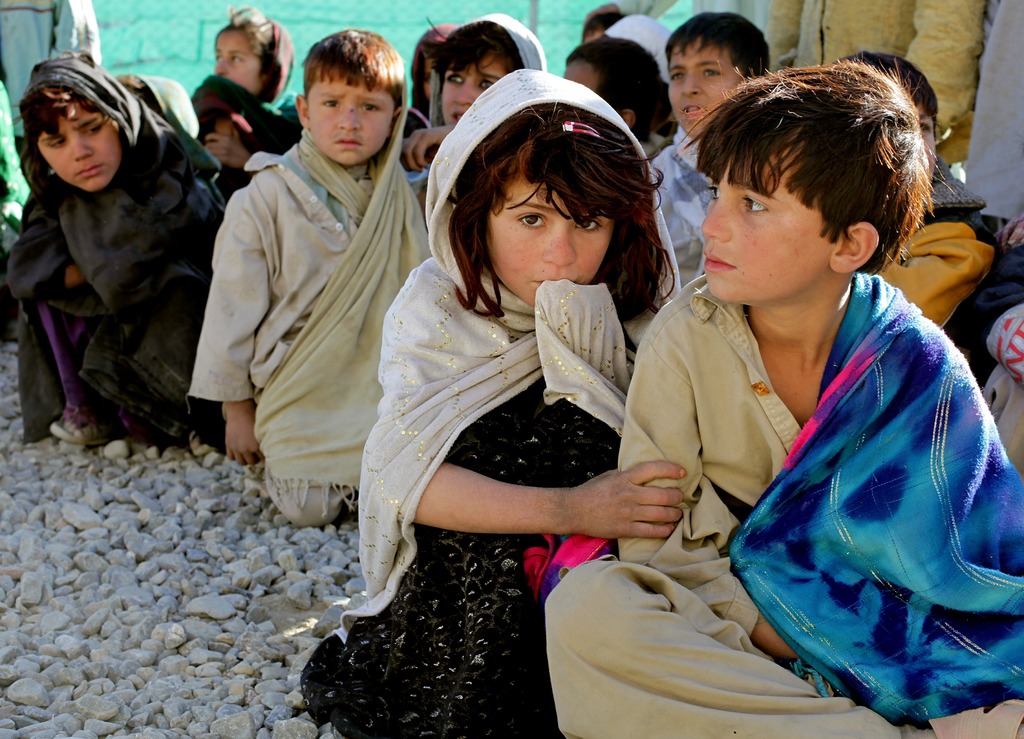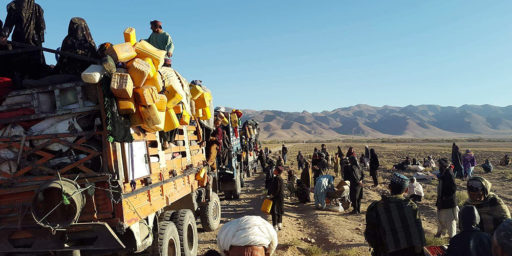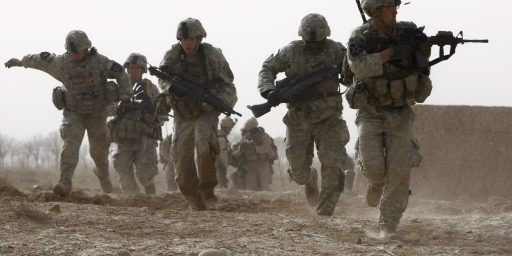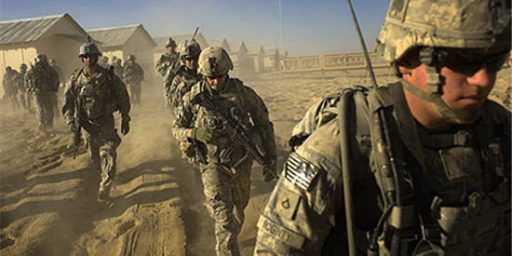US Sanctions Compounding Afghan Crisis II
There are no good options, only bad and worse ones.

In Sunday’s post, “US Sanctions Compounding Afghan Crisis,” I passed along news of mass starvation under the new Taliban government, partly caused by the massive withdrawal of aid and the imposition of sanctions on the regime by the West, including the United States. My reaction was modest:
That things would get much worse for the Afghan people once the Taliban returned to power and Western (mostly American) money dried up was inevitable. We obviously weren’t going to continue sending billions of dollars a year to the new regime. But our sanctions policy is compounding a humanitarian crisis.
{…]
Again, not putting money directly into the hands of the Taliban is understandable. The obvious compromise would be to let trusted organizations—the Red Crescent and UNICEF come immediately to mind—administer the aid, handing out food and medicine directly to families.
Dan Drezner, who among other things is an expert on international sanctions, is more critical. But, first, he gives the Biden team credit:
Devoted fans of Spoiler Alerts — all 14 of you! — are fully aware of my concerns about how the United States is abusing economic sanctions in recent years. This has been a bipartisan problem that has gotten worse with each successive administration.
To president Biden’s credit, his administration seemed intent on reversing this trend. Treasury Secretary Janet Yellen ordered a review led by Deputy Treasury Secretary Wally Adeyemo and published six weeks ago. In late October I wrote a favorable column about the review but cautioned, “This report is a framework document. There are few concrete details (beyond the hardy perennial of improving the website) of how these principles will be met. This invites some skepticism.”
Alas, he judges the administration is failing to live up to its own guidelines:
Do the current sanctions against the Taliban support “a clear policy objective within a broader U.S. government strategy”? Only if that policy objective is categorically denying the Taliban formal recognition. Continued sanctions will not lead to the Taliban’s demise, A starving populace is literally too weak to rebel, and the Taliban will feed their own before feeding anyone else.
What about “incorporates anticipated economic and political implications for the sanctions target(s), U.S. economy, allies, and third parties and has been calibrated to mitigate unintended impacts”? Nope, this is definitely a sanctions fail. Again, the prospect of a winter that kills more Afghan civilians than a generation of war seems like poorly calibrated sanctions. The ICG report references the likelihood of increased refugee flows to Europe. If memory serves this has led to considerable populist blowback in recent years.
I get that the political optics of sending aid to Taliban-run Afghanistan are not great. I have no desire to empower the Taliban any further. Afghanistan’s current rulers should shoulder most of the blame for what is happening in Afghanistan right now. But I am old enough to remember how sanctions narratives play out. If this status quo persists, the United States will stand accused of fomenting a humanitarian disaster.
This is a situation, not uncommon in foreign policymaking, when there are no good options. But letting millions of innocents starve is the second-worst outcome here, exceeded only by intentionally contributing to the causes of that starvation.






Part of this equation should be the inevitable demand of despots getting outside aid that the relief packages be unmarked, the aid workers confined to central distribution facilities, and the actual handout done by the despots themselves, and used to reward favored groups and withheld from those less pleasing to their government. We can see from Syria and NK, to name just two, that such regimes would much, much rather let their people starve than admit they couldn’t provide food but the hated enemy could.
Read this with my earlier coffee. Quite a bit of difficulty facing the Taliban:
https://warontherocks.com/2021/11/brutally-ineffective-how-the-taliban-are-failing-in-their-new-role-as-counter-insurgents/
After centuries of foreign power involvement in Afghanistan, it should be clear that only the people living in that fouled country can change their destiny. If the people of Afghanistan continue to allow despotism, they will remain in a state of suffering. If they seek freedom from despotism, poverty, and hunger, then they need to rise up. After decades of trying to get them to see a future that offers possibilities and something better, the U.S. should not reward their militant leadership an once of assistance. Unless things change, this might be one case where I say our thoughts and prayers for the people of Afghanistan might just be all we should muster… we got enough to work on right here in the U.S.A with regard to the recent and relentless assault on our democratic institutions. On the other hand, we should all strive to be good Samaritans… no easy choices indeed!
It’s a very sad situation but there is no “Schrödinger’s country”. Afghanistan is either our responsibility (under the “Pottery Barn” rule) or it isn’t. IMO the best available alternative is for the UN to provide assistance and for the limit of direct U. S. action to be not vetoing any Security Council resolutions about the assistance.
I see no reason to provide aid to a regime that abuses its people. The pottery barn analogy applied while we were there, they kicked us out. So be it.
@Raoul:
I’m quite sure nearly all of those who present that argument would utterly abandon it if they had to sell it to one, just one, bug-eyed skin and bones bloated belly little kid in front of them.
Off topic, but it’s the end of the day. Where do photographers find the children in Afghanistan that punch the “white kid suffering” button? The earliest one I remember striking me was the Afghan girl photo from the early 1980s.
@Michael Cain: Fair question.